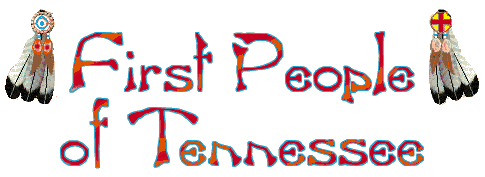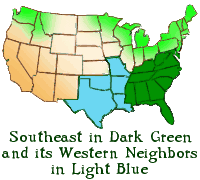

 “First People of
Tennessee and the American Southeast
“First People of
Tennessee and the American Southeast” is a
TNGenWeb website.
It was created to provide a forum for both those with native roots that
reach back into that most difficult to research time,
the period before the removal, a.k.a., the trail of tears; and also to
help those whose ancestors avoided that removal.
Without written records from the elder
times, the genealogy of the native peoples becomes a difficult study.
In a non-materialistic society, the need for a written language is
considerably reduced. It was the white man that kept the early written
records.
The treaties wherein the native peoples relinquished their lands are
well preserved,
and the well documented names of the various Chiefs appear repeatedly.
There are also some written histories where the names of some warriors,
both famous and infamous, do appear.
After the smoke cleared in southeast, when the fighting between the
native peoples and the whites stopped,
some few native names appear, but more often, you will find an European
name; that of a man whose wife was “Indian.” Indian men
who married white women sometimes assumed the wife’s maiden
name; sometimes for convenience, sometimes for protection.
Nobody ever said this study would be easy.
You might not be able to establish the “Preponderence of
Evidence” used by some in genealogy, but if you are not there
already, you should at least learn to respect the Elders, the Ancestors, and the
Great Spirit.
Today,
First People of Tennessee and the American Southeast has three query
boards: Cherokee Nation, Chickasaw Nation and Creek Nation. Please follow the link to most appropriate
Nation for you. We recognize that over the course of time, and so we are able to
add new Query Boards as needed.
If you can identify a county in which your ancestor might have lived,
consider placing an additional query on that TNGenWeb County Query Page.
We have along with those county pages, a Query Page called “County
Unknown.”
It is there for you if you need it.
Good hunting!
About First People of Tennessee
TNGenWeb has provided services to genealogists
studying Native American family history since Billie R. McNamara founded
Tennessee
Genealogy, TNGenWeb Project in 1996. Originally Ms. McNamara established
a series of First People query boards based specific locations inhabited by Tennessee’s
First People. In 1997, Ms. McNamara and Fred Smoot reorganized those query boards in a
newly formed
First People of Tennessee, thus establishing TNGenWeb’s
first Special Project. During 1998, Ms. G. Kay McGee joined the project and
maintained the query boards and the website, and helped folk with their personal questions
until 2001. Jerri Chasteen and Glen Davis are the current Co-Coordinators.
Our scope has broadened here. We now publish online our
information based on ethnic groups, not by
state boundaries. Therefore, we published work from the American southeast, westward to Texas,
Oklahoma, &c., in addition
to Tennessee publications.






















